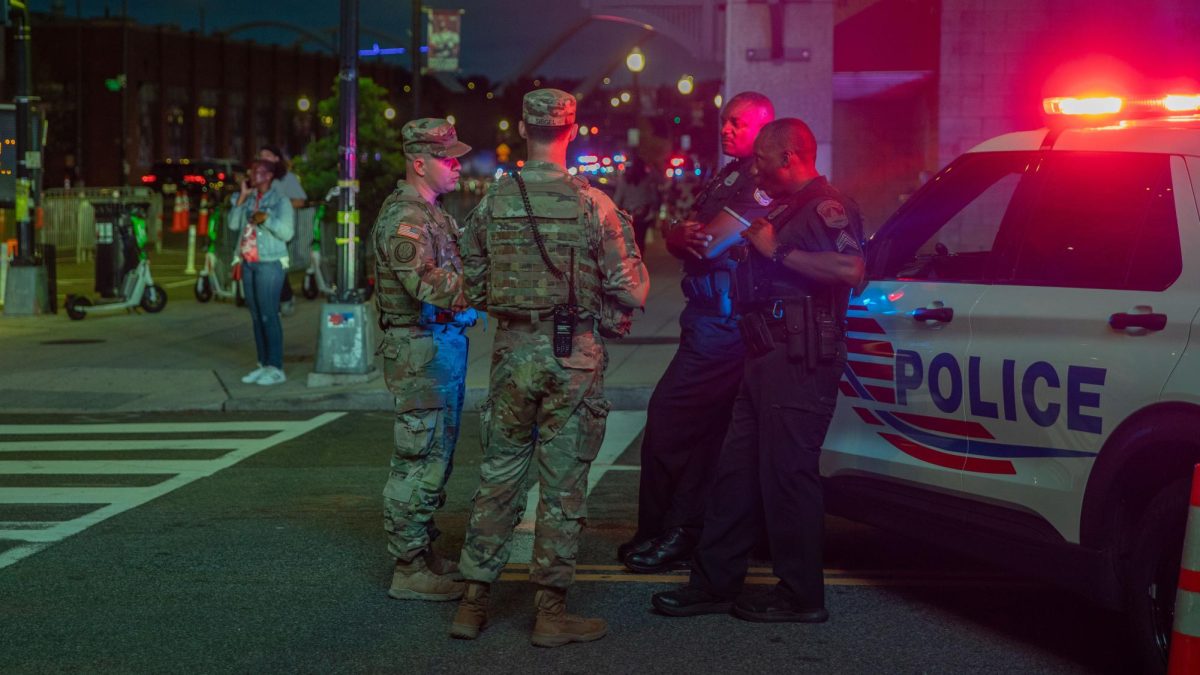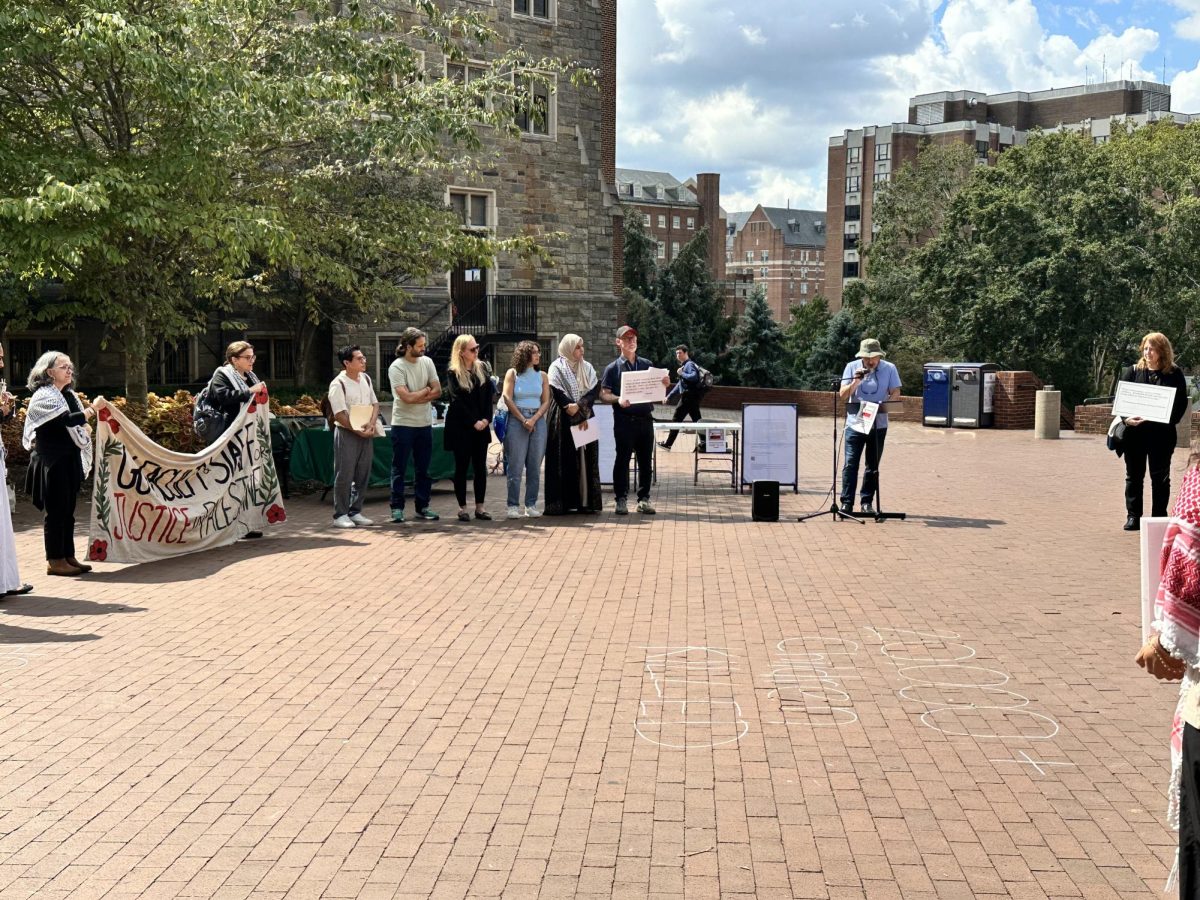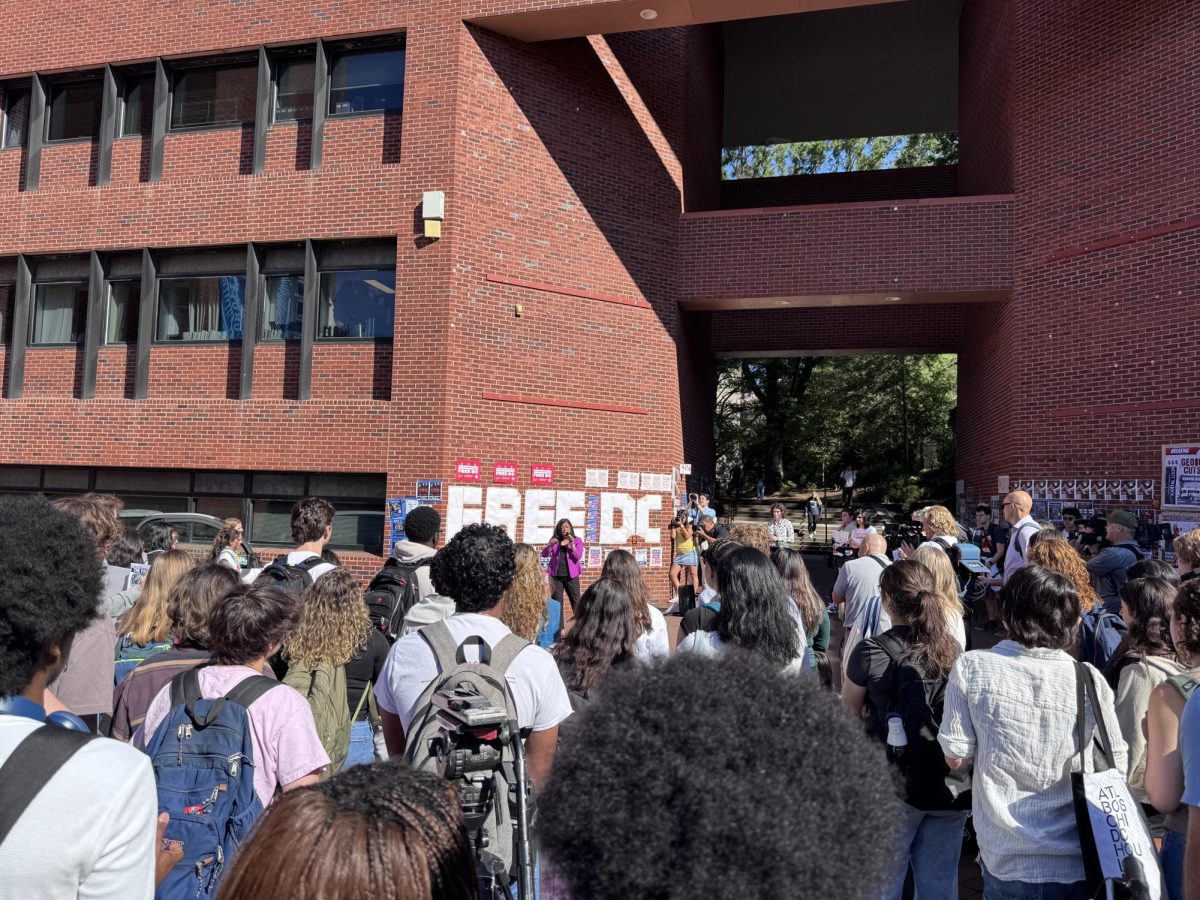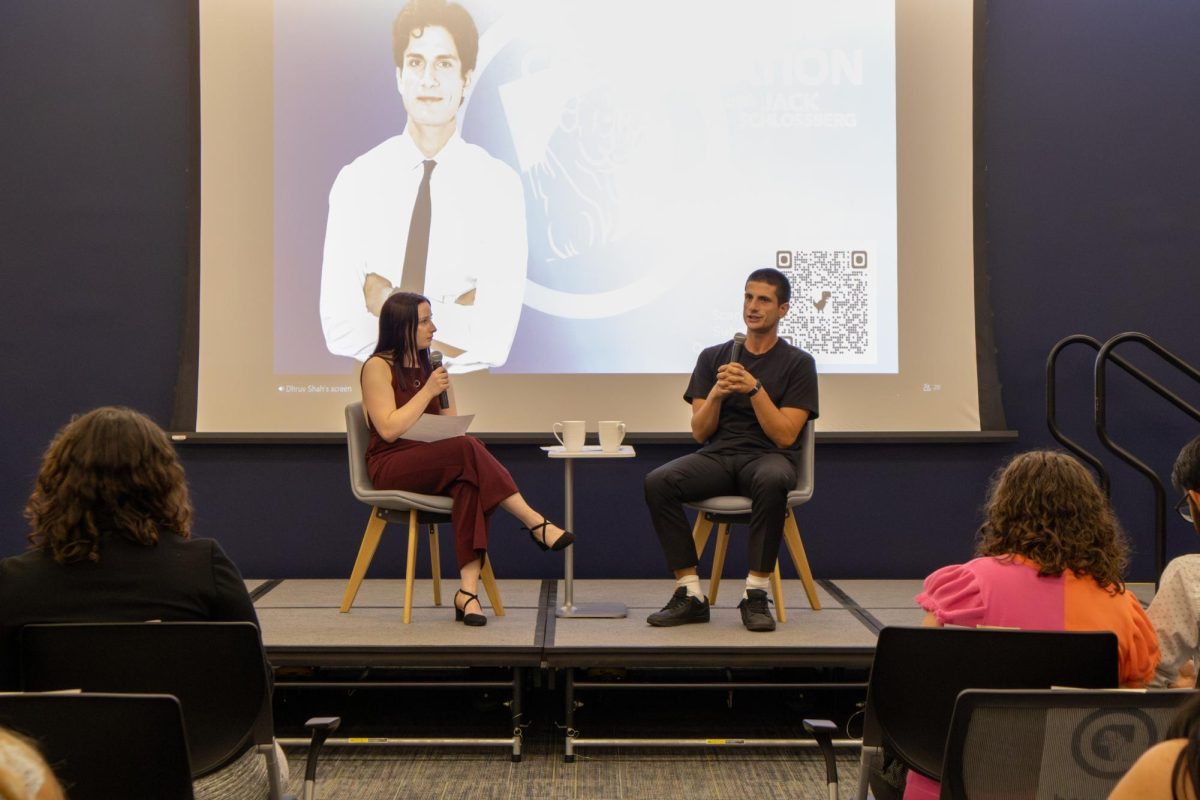Today, Georgetown University Interim President Robert M. Groves testified before a House of Representatives committee on antisemitism in higher education.
Groves testified for the House Committee on Education and Workforce alongside Félix V. Matos Rodríguez — the chancellor of The City University of New York — and Rich Lyons — the chancellor of the University of California, Berkeley — about the role of faculty and funding in antisemitism. Matt Nosanchuck, the former deputy assistant secretary for the Office for Civil Rights in the Department of Education, also testified.
A university spokesperson previously wrote to The Hoya that Groves “looks forward to testifying” and explaining Georgetown’s programming to prevent antisemitism.
“As a Catholic and Jesuit University, Georgetown condemns antisemitism and all forms of hatred and is committed to ensuring our university is a safe and welcoming space for every member of our community,” a spokesperson wrote.
Rep. Tim Walberg (R-Mich.) chairs the 45-person committee that oversees all education programming, including collegiate-level programs. The committee is also responsible for workforce policies such as retirement, equal employment and compensation for federal employees.
The committee has hosted five hearings that included other university presidents, such as Claudine Gay, the former president of Harvard University, and Minouche Shafik, the former president of Columbia University. Gay and Shafik both resigned from their positions amid negative responses to their testimony.
Read this previous analysis about what to expect for the hearing. The Hoya updated this story live as the hearing continued.
1:43 p.m. Update: Ranking Member, Chair Give Closing Arguments
Ranking Member Bobby Scott (D-Va.) submitted a letter into the record from a family of Israeli hostages captured by Hamas on Oct. 7 stating how Georgetown “made space” for them.
“Antisemitic incidents are all over the United States, not just on college campuses,” Scott said.
Scott said the Trump administration is eroding trust in the education system and is not committed to civil rights.
“If the administration was truly concerned with civil rights enforcement, it wouldn’t have gutted the Office of Civil Rights, the very agency charged with investigating discrimination on campuses across the country,” Scott said. “You can’t claim to be a champion for civil rights while disarming the body meant to enforce them.”
Walberg, the Republican chair, said the hearings are an essential part of the Trump administration and congressional Republicans’ missions.
“These hearings must continue,” Walberg said. “We must continue to highlight bad actors in our higher education institutions — that’s the reason we have an Education and Workforce Committee.”
Walberg criticized the answers of the leaders at all four universities, particularly telling Groves that his replies overlooked concerns of antisemitism at GU-Q.
“Georgetown refuses to recognize antisemitism at its Qatar campus,” Walberg said. “At least unwilling to say that it’s their responsibility that the things that go on at that campus, the awards given to people who are antisemitic, seem to continue.”
Walberg adjourned the hearing at 1:29 p.m., after just over three hours of testimony.
1:27 p.m. Update: Groves Defends Qatar Campus
Rep. Bobby Scott (D-Va.) asked Groves about the influence Georgetown has on international campuses, particularly in Qatar.
“We’re very proud of our mission in Qatar,” Groves said. “It’s completely consistent with the Jesuit animation of working at the frontiers, of serving groups that are not served easily in Washington.”
Groves said students at GU-Q also receive a Jesuit education and the “give and take of academic freedom that takes place on our D.C. campus.” Groves also said that 70% of students at GU-Q are women.
When asked about Georgetown’s influence in foreign countries, Groves said he sees Georgetown’s positive influence in Qatar.
“I’m convinced that gradually opening the eyes to new ways of thinking that we represent there, you can see the change occurring already,” Groves said. “Our alumni are taking positions of great importance over time in many countries of the world.”
1:20 p.m. Update: Congressman Questions Foreign Money, Transparency
Rep. Michael Baumgartner (R-Wash.) questioned Groves on the funding that Georgetown receives from Qatar, saying universities should be transparent.
Groves said the university attempts to report on foreign funding and noted that Georgetown received a letter of commendation from the U.S. Department of Education after a 2020 investigation into Qatari influence.
Groves told Baumgartner that he would be “happy to commit” to ensuring every dollar of foreign money would be transparent.
Baumgartner appeared more satisfied with Groves’ answer than that of Rich Lyons, the chancellor of the University of California, Berkeley, who refused to commit to full transparency like Groves did.
1:09 p.m. Update: Congressman Questions Georgetown Medal to Qatari Leader
Rep. Mark Harris (R-N.C.) criticized the university’s choice to award a medal to Sheikha Moza bint Nasser, chairperson of the Qatar Foundation, which runs Georgetown’s campus in Qatar. Nasser’s award recognizes her humanitarian work in children’s education.
Nasser previously made statements on social media praising Yahya Sinwar, who orchestrated the Oct. 7 attacks, after his death. Nasser wrote that Sinwar will “live on” after his death.
“It seems that some at Georgetown have been captured by the beliefs of some ideologies that are at odds with Georgetown’s Catholic and Jesuit mission,” Harris said. “In fact, it looks like you are celebrating ideas that are in direct opposition to these values.”
When Harris asked why Georgetown gave Nasser the medal, Groves said the university celebrated her humanitarian work.
“The award to Sheikha Moza was given for her work — her decades-long work for educating, getting access to education to the poorest children around the world,” Groves said. “At this point, there are 22 million children in the world that would not have had access to education without her work.”
Harris asked Groves if the “destruction of Israel” is something Georgetown would support. Groves said he does not agree with the statement, yet would not revoke the medal because it pertained to Nasser’s work for educating children.
“We will not revoke the medal because the reason for the medal is still true,” Groves said.
12:51 p.m. Update: Congress Members From Both Parties Question Free Speech Policies, Ideological Diversity
Rep. Glenn Grothman (R-Wis.) said college students often hide their viewpoints and cannot “say what’s on their mind” out of fear of getting bad grades from progressive faculty.
When asked if it bothered him, Groves said: “Not if we have a thriving dialogue present.”
Rep. Ilhan Omar (D-Minn.) cited threats to student activists and academic speech and asked university leaders how they protect campus speech.
“Reports of doxxing are acted on quite quickly and investigated,” Groves said.
12:44 p.m. Update: Congressman Grills Groves on Antisemitic Speech, Safety
After the interruptions from protesters, Fine raised his voice at university leaders, questioning them on why they employ faculty who have made controversial or antisemitic statements.
“There should not be a ‘but’ after it when it comes to antisemites,” Fine said, referring to Groves’ previous statement that Georgetown endeavors to have speakers from ‘many different sides.’”
Fine, who is Jewish, asked each university leader to explain how they could tell his son “in good conscience that he would be safe at any of your schools.”
Groves said antisemitism is antithetical to Georgetown’s mission, and religious tolerance is ingrained in the university.
“I would deeply hope he would feel safe, and there’s a reason for this at Georgetown,” Groves said. “If Jewish students don’t feel safe, if they have fear. It’s not just hurtful to them, it destroys our mission of interreligious dialogue.”
Fine said to all three university leaders that Jewish students do not feel safe.
“The Jewish students on your campus do not feel safe today, and you should be ashamed of that,” Fine said.
12:37 p.m. Update: Congressman Yells After Three Additional Protesters Interrupt Hearing
A second protester interrupted the hearing, yelling, “You’re complicit in the genocide of Palestinians! Free Palestine.”
Walberg said the committee’s hearing would continue despite the second disruption.
“Chair notes that there is this disturbance that takes place, but this committee will continue, will complete its planned hearing,” Walberg said.
A third protester interrupted shortly after, yelling about “burning children alive” before being escorted out of the room.
Rep. Randy Fine (R-Fla.), who was speaking when a fourth protester interrupted the hearing, yelled at the protester and blamed university leaders for fostering a culture of acceptance.
“Shut up and get out of here, you loser,” Fine said. “It is the attitude that you have allowed on your college campuses that makes people think this is okay.”
After the interruptions, Fine began raising his voice at university professors.
12:29 p.m. Update: Groves Answers Question on Purpose of Qatar Campus
Rep. Robert Onder (R-Mo.) asked about the purpose and origin of Georgetown’s campus at Qatar (GU-Q), which Groves said intends to spread Georgetown’s values and education to the Middle East.
“My understanding is that the vision of Qatar Foundation at the time was to build a group of western universities in Doha that would offer western education to the region — in a vision that Qatar would gradually become a hub for higher education and research,” Groves said.
The state-run Qatar Foundation operates GU-Q, covering all operating costs and receiving tuition fees from students. The campus first opened in 2005, and the university recently renewed its contract with the Qatar Foundation.
Groves also agreed with Onder’s statement that the Qatar campus would offer “Western-style, Jesuit-style higher education in the Middle East.”
12:27 p.m. Update: Groves Responds to Speaker Connections
Shortly before the outburst, Rep. Rick Allen (R-Ga.) discussed Francesca Albanese, who serves as the United Nations Special Rapporteur on the Situation of Human Rights in the Palestinian Territories, asking Groves if she was still affiliated with the university after accusations of antisemitic remarks.
Groves said Albanese, who has spoken at the university condemning Israel, is not on the university payroll.
“She’s still listed as an affiliate, but she’s not present on campus.”
Allen concluded by saying universities should fire faculty and fellows responsible for antisemitic rhetoric.
“You’ve gotta have guardrails, and if you get outside those guardrails, you do something about it,” Allen said to Groves. “You don’t let this stuff just linger on, because it just rots.”
“For crying out loud, you’ve got to get rid of these people that are perpetrating this hate,” Allen added.
Later in the hearing, Rep. Burgess Owens (R-Utah) asked all three university leaders a series of yes or no questions.
Groves agreed with Owens’ statement that “denying the Jewish people their rights to self-determination” is antisemitism. In response to whether phrases like “Globalize the intifada” that are “celebrating violence against Jews” constitute antisemitism, Groves said, “As a threat, absolutely.”
Owens questioned Groves on Georgetown’s connections to Mohammed el-Kurd, a Palestinian writer and activist, though Groves said he was not aware of el-Kurd.
Owens directed Groves to statements el-Kurd has previously made, which strongly criticize Israel, including an Instagram story post saying, “There is no evil like the evil of Zionism. May every single Zionist perish.”
In response to Owens’ asking Groves if the statements were “pure evil,” Groves replied, “Yes.”
Owens said that el-Kurd also made accusations that Israelis were harvesting organs, had a “thirst for blood” and that Jewish people control the media.
Owens posed a hypothetical to Groves, asking whether Groves would allow “a member of the KKK who wished the deaths of Black Americans to speak at Georgetown.”
Groves said the university would not but highlighted efforts to bring a diverse set of speakers to campus.
“No, but we endeavor to have speakers from many different sides,” Groves said before Owens cut him off.
Groves later said the university would not platform or invite a member of the KKK.
Owens continued, saying that if the university would “disallow white KKK bigots on campus, why would the university allow faculty or students to invite Palestinian anti-semitic bigots, because that’s who this guy is.”
11:55 a.m. Update: Protester Interrupts Hearing
At 11:46 a.m., a protester interrupted CUNY chancellor Félix V. Matos Rodríguez shouting that universities and federal government were complicit in “genocide.” The room was quiet as the protester was escorted from the hearing before Rodríguez resumed his testimony.
“There’s blood on your hands,” the protester shouted. “You are genocidal war criminals and you will pay.”
11:46 a.m. Update: Groves Faces Questions on Faculty, Antisemitic Incidents
Rep. Glenn Thompson (R-Penn.) asked Groves about flyers slid under the doors of first-year residences on their respective move-in days in August 2024, which falsely claimed residents had been evicted from their dorms and were required to move immediately.
The flyers also called for Georgetown University to divest from major companies that hold contracts with the Israel Defense Forces (IDF), such as Google’s holding company Alphabet Inc. and Amazon, and for the university to end study abroad programs in Jaffa and Haifa in Israel.
Groves said university staff removed the flyers and identified and disciplined the perpetrator, also condemning the flyers.
“This was abhorrent, and for the students who saw this and were hurt by this, we apologize as a university,” Groves said. “This is intolerable at Georgetown; we can not have this sort of behavior.”
In response to Thompson’s question on whether Georgetown had antisemitic faculty, Groves said the university allows faculty to exercise free speech rights while monitoring statements related to the university.
“We police carefully the behavior of our faculty in the classroom and their research activities,” Groves added. “They are free, as all residents of the United States, to have speech in the public domain.”
Thompson also cited alleged posts from Emad Shahin, a senior fellow in the Alwaleed Bin Talal Center for Muslim-Christian Understanding, that applauded Hamas’ Oct. 7 attack. The Hoya was unable to independently verify the existence of such posts.
Groves declined to comment on the specifics of cases brought up by Thompson but said the university has fired faculty for antisemitism actions.
“I can assure you that, Congressman, that we have dismissed faculty for antisemitic behavior on social media and in the classroom, and also dismissed staff for the same behavior,” Groves said.
Thompson also seemed skeptical of the ACMCU, saying he found the idea of “Muslim-Christian understanding” to be “interesting.”
Thompson also brought up statements from Mobashra Tazamal, associate director of Georgetown’s Bridge Initiative, which researches Islamophobia. Tazamal reposted a statement that read, “Israel has been recreating Auschwitz in Gaza for two years,” according to Thompson. The Hoya was unable to independently verify the statement’s existence.
“I reject those kinds of statements,” Groves said in response. “That’s not the policy of Georgetown, and I want everyone to know that to the extent that that hurt Jewish students, Jewish faculty, Jewish staff at Georgetown, I apologize for that. But that’s behavior covered under the First Amendment on social media that we don’t intervene on. What we do intervene on quickly is behavior that affects our students in the classroom and research-related activities that involve students.”
Groves said the university collaborates with campus organizations to support Jewish students and understand campus culture.
“We have a variety of ways to stay in touch with our Jewish community,” Groves said. “Our Jewish Life Office is a wonderful resource, we meet with our rabbi, we meet with Jewish students, we meet with Jewish faculty to keep a sense of the pulse of the culture.”
11:30 a.m. Update: Questioning Begins
Walberg began questioning the university leadership by asking each of them to define antisemitism. Groves said antisemitism includes hate toward Jewish people.
“We define antisemitism as hatred of the Jewish people and all of the behaviors that might be connected with such hatred,” Groves said.
Walberg said he was grateful Groves and the other university leaders were able to provide a clear definition of antisemitism.
Rep. Suzanne Bonamici (D-Ore.), who is Jewish, said the hearing itself is not an attempt to combat antisemitism but rather to bolster efforts to cut higher education funding. She added that her Republican colleagues do not care about antisemitism, pointing to the defunding of the U.S. Department of Education’s Office of Civil Rights (OCR) under the administration of President Donald Trump.
“Will my Republican colleagues stand against the ongoing attacks on the Office for Civil Rights?” Bonamici said at the hearing. “And what about the hate crime prevention grants? Will any Republican colleagues advocate for these funds to be reinstated? Of course not. That would be real action. Why do that when we can create another political side show instead?”
“My colleagues are weaponizing the real problems of the Jewish community, a community I am an active member of, in furtherance of their attacks on and plans to defund colleges and universities,” Bomanici added.
Rep. Virginia Foxx (R-N.C.) questioned Groves regarding posts on X, formerly known as Twitter, from Professor Jonathan A. C. Brown (COL ’00), former chair pending review in the department of Arabic and Islamic studies.
“Is this person really suited to be educating the next generation of American diplomats?” Foxx said at the hearing.
Brown has faced criticism for his advocacy in support of Palestine, alleged familial ties to terrorists in the Middle East and discussion of slavery and rape in Islam. In June, conservative groups attacked Brown for a post on X that some interpreted as a call for Iran to bomb a U.S. military base.
“I hope Iran does some symbolic strike on a base, then everyone stops,” Brown posted.
“I deleted my previous tweet because a lot of people were interpreting it as a call for violence,” Brown said in a later post on X. “That’s not what I intended.”
According to Groves, the university removed Brown as chair and Brown is on leave as the university conducts a review of the case. Brown has tenure at Georgetown.
Rep. Mark Takano (D-Calif.) said Republican congressmembers are using the hearing to target higher education, highlighting the closure of OCR regional offices that investigate Title VI violations at universities.
“While the majority uses hearings like this one to rail against foreign influence while their own administration routinely violates clear ethics boundaries with foreign governments, they have turned this room into a kangaroo court where they spend our time litigating a predetermined outcome to do nothing to actually help Jewish students, just make public theater out of legitimate pain,” Takano said at the hearing.
11:03 a.m. Update: Groves Presents Opening Statement
Groves was the first university leader to give testimony at the hearing. His remarks focused on summarizing his previously submitted written testimony, which emphasized Georgetown’s commitment to preventing antisemitism and fostering interreligious dialogue.
Groves said Georgetown’s religious beliefs “demand the absence of antisemitism and other hatreds.”
“Any hatred or fear among our students destroys that dialogue,” Groves said at the hearing. “Antisemitism is incompatible with living our mission.”
Groves added that Georgetown’s interfaith tradition guides its response to antisemitism, saying the university has a full-time rabbi as well as representatives of other major global faiths.
Groves touted the university’s efforts to combat antisemitism in the aftermath of Hamas’ Oct. 7, 2023 attack on Israel, particularly through condemning the attacks, addressing antisemitism and bias-related incidents and supporting interreligious dialogue.
Groves said Georgetown was one of the first universities to condemn the Oct. 7 attacks.
Groves said that despite a broad international presence — now operating in 16 countries — the university maintains full control over curriculum, admissions, faculty and research, while also abiding by the policies of foreign governments.
“This has taught us the need to respect laws of other countries and their cultures despite disagreeing with some of their government’s policies,” Groves said.
10:43 a.m. Update: Groves Sends Written Testimony
At 10:06 a.m., Groves sent an email to the Georgetown community members that included his written testimony in advance of the hearing.
Groves said he hopes his remarks “attempt to convey” the university’s mission of interfaith dialogue.
“For many decades the Church has asked the Jesuits to lead the way globally in interfaith dialogue,” Groves wrote in the email. “Hence, our mission states: ‘Serious and sustained discourse among people of different faiths, cultures, and beliefs promotes intellectual, ethical, and spiritual understanding.’ This is what Georgetown constantly aspires to achieve.”
In the email, Groves sent his planned written testimony, which details the university’s commitment to preventing antisemitism and hateful speech on campus.
The testimony includes descriptions of major student Jewish and Israeli organizations and academic groups, which Groves said demonstrate Georgetown’s support system for Jewish students and faculty.
“While Georgetown’s Catholic and Jesuit animation sustains a devoted staff of faith leaders, it also attempts to integrate such values into educational and research units,” Groves wrote in the testimony. “In the fraught environment post the October 7th Hamas attack, these units have offered important intellectual resources to help students, staff, and faculty support one another.”
Groves addressed the university’s policies for campus protests, saying Georgetown has not had any violent or disruptive protests, including encampments, which university policy bans.
“Though there have been protests and commemorative events on campus, they have been conducted peacefully and in accordance with Georgetown’s long-standing speech and expression policy which places clear time, place, and manner guidelines on such activities,” Groves wrote. “Those guidelines have been rigorously enforced. No events on campus have been terminated due to disruptions.”
“We take some comfort in the fact that we have had no encampment, no violence, no cancelation of commencement ceremonies, no metropolitan police activity on the Georgetown campus,” Groves added. “We have successfully had speakers with starkly different viewpoints regarding Middle East issues. We are committed to informed dialogue across differences.”
Several student and faculty protests have been held against Georgetown’s financial ties with Israel and have called for the university to divest from Israel.
Groves said the university has implemented a new policy banning masks at student protests when students are engaged in any illegal activity or in violation of university policies on campus following an “annual review” of its practices.
“Our prior guidelines were not explicit about the use of masks preventing us from identifying demonstrators,” Groves wrote. “We’ve recently strengthened enforcement guidelines to prohibit the wearing of masks while engaged in any activity that is unlawful or in violation of university policies on campus. To determine whether someone is a member of the community we request a Georgetown photo identification, which requires visual verification.”
At most student protests, particularly pro-Palestine demonstrations, many students wear masks out of fear of retaliation.
Groves also revealed a close relationship between the university and the Anti-Defamation League (ADL), an international nonprofit combating antisemitism, to address campus antisemitism.
“We collaborate with national organizations like the Anti-Defamation League to improve our practices, refine our training, and elevate Jewish student voices,” Groves wrote. “Since that time, Georgetown has addressed some of ADL’s critiques.”
Groves cited revisions to anti-discrimination policies to explicitly prohibit antisemitism and the addition of mandatory antisemitism education for all incoming students and student leaders. He also pointed to the changes in speech and expression guidelines and the university’s decision to reject a student referendum that called on the university to end partnerships with Israeli universities and divest from companies with ties to Israel.
Groves said university leadership has met with ADL staff, a meeting that had not been previously disclosed by the university, in its efforts to combat antisemitism. Groves added that in recent meetings with the ADL, the organization suggested the university would get “additional credit” in the ADL’s campus antisemitism rating.
Groves tied Georgetown’s commitment to combating antisemitism to its Jesuit values, saying the university would constantly work to improve itself.
“Georgetown is not perfect. We have confronted issues not anticipated by our original conduct policies,” Groves wrote. “When we encounter unanticipated challenges, we attempt to improve policies and practices. This is never-ending. This is part of the Jesuit model of ‘discernment,’ where one prayerfully reflects on the past in order to do better in the future.”
This article has been updated to reflect recent developments.

























Ted Weihe • Jul 15, 2025 at 3:37 pm
Glad to be a SFS graduate in 1965. I implement projects for over a dozen years to support Palestinian cooperatives in full cooperation with Israel cooperative peacemakers. I agree with the Jesuit perspective of dialogue among different faiths and helping the repressed that certainly includes Palestinians on the West Bank and Gaza. Community bases cooperatives on the West Bank for sheep, goats, and olive oil is one way the US can provide economic support unfortunately, all of these projects have been terminated with the demise of USAID where I worked as a political appointee of Jimmy Carter, and serving on its Presidential advisory committee for 17 years. Thank you Georgetown for enabling me to serve.